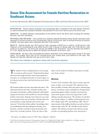 8 citations,
October 1988 in “Clinics in Dermatology”
8 citations,
October 1988 in “Clinics in Dermatology” Current research explores hair growth drugs, while future research aims for personalized treatments.
 55 citations,
February 1985 in “Archives of Dermatology”
55 citations,
February 1985 in “Archives of Dermatology” Using minoxidil on the scalp can help grow hair for people with hereditary baldness.
 April 2024 in “European Journal of Dermatology”
April 2024 in “European Journal of Dermatology” The 2940-nm Er: YAG fractional laser may help treat receding frontal hairlines in men with androgenetic alopecia.
January 2020 in “JAAD case reports” Hair loss condition FFA was seen before the appearance of skin depigmentation vitiligo in a patient.
 October 2023 in “Journal of the Endocrine Society”
October 2023 in “Journal of the Endocrine Society” A woman's increased facial hair and hair loss were caused by a rare ovarian tumor, cured by surgery.
 January 2024 in “The Journal of Dermatology”
January 2024 in “The Journal of Dermatology” Taking finasteride every other month can still help with hair loss but may be less effective over time compared to taking it daily.
 9 citations,
January 2001 in “Dermatology”
9 citations,
January 2001 in “Dermatology” Pili anulati may cause hair loss, proper diagnosis and treatment needed.
 39 citations,
September 2013 in “Journal of Cosmetic Dermatology”
39 citations,
September 2013 in “Journal of Cosmetic Dermatology” Herbs can potentially treat hair loss by inhibiting a key enzyme and promoting hair growth, and deficiencies in zinc, biotin, and iron are linked to hair loss.

Detailed history and physical examination are crucial for diagnosing hair loss.

Finasteride and low-level laser therapy are similarly effective for frontal pattern hair loss.
 13 citations,
June 2020 in “Journal of Dermatological Treatment”
13 citations,
June 2020 in “Journal of Dermatological Treatment” Topical finasteride helps regrow hair and reduce hair loss in men and women.
March 2023 in “Journal of Cosmetic Dermatology” Low-dose oral minoxidil improved hair growth when topical treatments failed.
 234 citations,
February 2001 in “British Journal of Dermatology”
234 citations,
February 2001 in “British Journal of Dermatology” FPHL affects hair density and diameter, causing visible hair loss in older women.
21 citations,
March 2018 in “JEADV. Journal of the European Academy of Dermatology and Venereology/Journal of the European Academy of Dermatology and Venereology” 5-alpha-reductase inhibitors may help stabilize or slow down hair loss in some frontal fibrosing alopecia patients, but more research is needed to confirm their effectiveness and safety.
 17 citations,
October 2017 in “Journal of Cutaneous Medicine and Surgery”
17 citations,
October 2017 in “Journal of Cutaneous Medicine and Surgery” No treatment has been proven to effectively stop hair loss or regrow hair in Frontal Fibrosing Alopecia, and more research is needed.

Using scalp stem cells can improve hair transplants.

A hair transplant using hair from the back of the head and pubic area was successful in creating a feminine hairline for a male-to-female transgender person.
 9 citations,
August 2018 in “Journal der Deutschen Dermatologischen Gesellschaft”
9 citations,
August 2018 in “Journal der Deutschen Dermatologischen Gesellschaft” Most patients with frontal fibrosing alopecia are middle-aged women, often have thyroid disease, and some treatments can help stabilize the condition.
 21 citations,
January 2000 in “Aesthetic Plastic Surgery”
21 citations,
January 2000 in “Aesthetic Plastic Surgery” Researchers created a new system to classify male baldness, finding six types and a common hairline shape, to improve hair loss treatments.
6 citations,
January 2019 in “Indian Journal of Dermatology, Venereology and Leprology” Low-cost dermoscopes can effectively diagnose early female pattern hair loss.
 7 citations,
February 2021 in “Dermatologic Therapy”
7 citations,
February 2021 in “Dermatologic Therapy” Sebaceous glands are involved in various skin disorders, some treatable with medications like finasteride and minoxidil.
 27 citations,
September 2012 in “Dermatologic Clinics”
27 citations,
September 2012 in “Dermatologic Clinics” The document concludes that using specific tools and tests is essential for identifying the cause of hair loss and deciding on the right treatment.
 17 citations,
June 2016 in “Australasian Journal of Dermatology”
17 citations,
June 2016 in “Australasian Journal of Dermatology” Treatment with dutasteride, minoxidil, and artificial hair transplantation improved appearance but caused folliculitis.
 5 citations,
March 2018 in “Dermatologic Surgery”
5 citations,
March 2018 in “Dermatologic Surgery” The study found that most donor sites are good for hairline restoration in Southeast Asian women, but hair characteristics should match for a natural look, and aging can reduce hair density and diameter.
February 2021 in “International journal of regenerative medicine” A new method using fat tissue cells may help treat hair loss.
1 citations,
February 2017 in “PubMed” The supplement may help hair growth and is safe, but more research is needed.
 January 2023 in “Operative Techniques in Otolaryngology-Head and Neck Surgery”
January 2023 in “Operative Techniques in Otolaryngology-Head and Neck Surgery” Hair transplants help transgender patients look more like their gender identity, with different procedures for trans women and men.
November 2014 in “PharmaTutor” Finasteride may help postmenopausal women with hair loss but is not effective for all and should be used cautiously in premenopausal women.
 September 2021 in “Revista Interdisciplinar em Saúde”
September 2021 in “Revista Interdisciplinar em Saúde” Oral isotretinoína effectively stabilizes frontal fibrosing alopecia.
 17 citations,
December 2004 in “The Journal of Men's Health & Gender”
17 citations,
December 2004 in “The Journal of Men's Health & Gender” Male pattern baldness involves hormone-related hair thinning, shorter hair, and inflammation.























